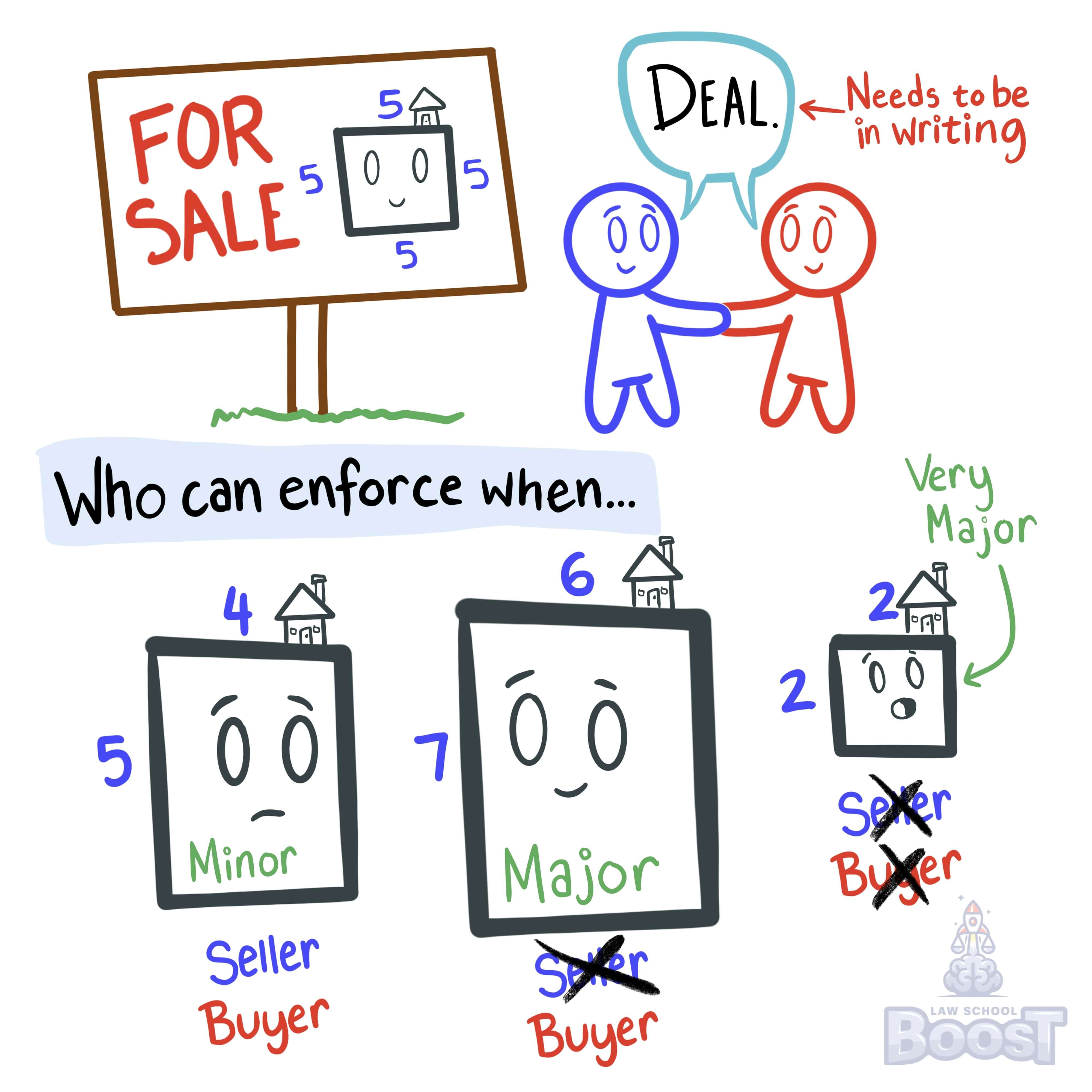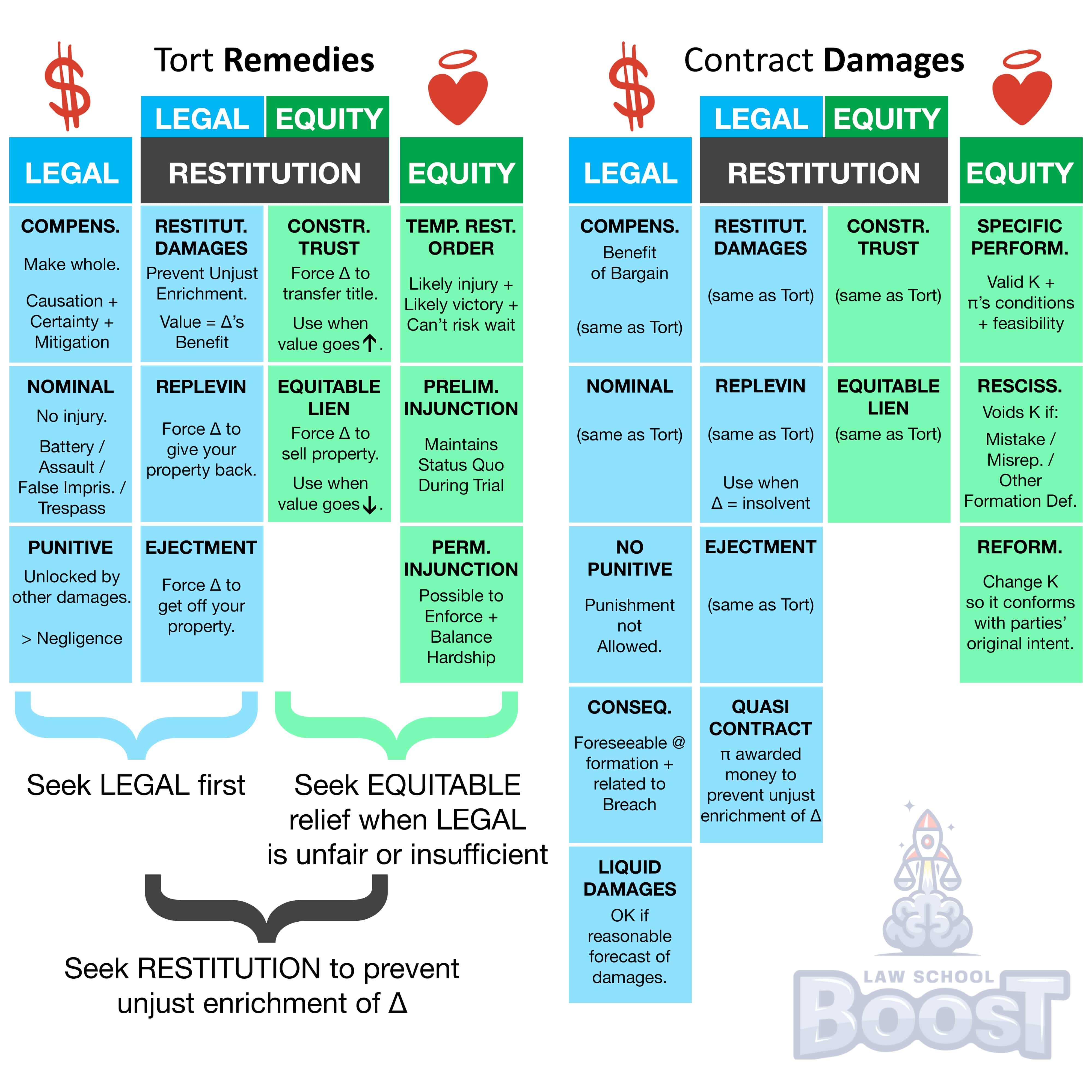🏥
Remedies • Contract - Equitable Remedies
REM#054
Legal Definition
If the seller is the plaintiff, they can specifically enforce the contract if the defect is minor, but cannot enforce the contract if the defect is major (unless the seller can cure the defect before closing).
If the buyer is the plaintiff, they can specifically enforce the contract even if the defect is major, but cannot enforce the contract if the defect is very major. If the court grants specific performance for a lesser quantity of land, it will abate the purchase price.
If the buyer is the plaintiff, they can specifically enforce the contract even if the defect is major, but cannot enforce the contract if the defect is very major. If the court grants specific performance for a lesser quantity of land, it will abate the purchase price.
Plain English Explanation
Have you ever been wrong about how tall you actually are? You think you're 6'2" but you're actually 5'10"? These things happening. Measuring stuff accurately can be hard, even when it is ourselves. Now imagine how hard it is to accurately measure a piece of land (especially before modern technology existed). Sometimes there are mistakes in calculations. Thus, when someone wants to buy a piece of land, but there's a disagreement about how much land is actually being sold, the law has a way to handle it. If the seller is the one complaining, they can still make the sale happen if the problem with the land size is small. But if the problem is big, they can't force the sale unless they first fix the issue before the deal closes.
On the other hand, if the buyer is the one complaining, they can still go ahead with the purchase even if the problem is big, but not if it's extremely big.
In other words, for sellers, courts are willing to overlook small problems but not big ones, and for buyers, courts are willing to let buyers forgive big problems so long as they aren't too ridiculous.
If the court decides that the buyer will less land than agreed, then the buyer should also pay less money than the original agreement.
On the other hand, if the buyer is the one complaining, they can still go ahead with the purchase even if the problem is big, but not if it's extremely big.
In other words, for sellers, courts are willing to overlook small problems but not big ones, and for buyers, courts are willing to let buyers forgive big problems so long as they aren't too ridiculous.
If the court decides that the buyer will less land than agreed, then the buyer should also pay less money than the original agreement.
Hypothetical
Hypo 1: Bob agrees to sell Sam a 10-acre piece of land. When Sam measures it, he finds out it's only 9.9 acres. Bob, the seller, insists on going through with the sale. Result: Since the defect is minor (only 0.1 acres short), Bob can likely still enforce the sale, but the price will likely be reduced.
Hypo 2: Bob wants to sell a 10-acre land to Sam. But Sam discovers it's only 7 acres. Bob still wants to sell. Result: The defect is major (3 acres short). Bob cannot enforce the sale unless he can fix this issue before the deal closes, possibly by purchasing neighboring land to increase the plot to 10 acres.
Hypo 3: Sam agrees to buy a 10-acre land from Bob. After measuring, Sam finds out it's only 8 acres. Sam still wants to buy. Result: Even though the defect is major (2 acres short), Sam can enforce the sale because the buyer has more flexibility.
Hypo 4: Sam wants to buy a 10-acre land from Bob. Upon measuring, he realizes it's only 5 acres. Sam still wants to buy. Result: The defect is very major (5 acres short). Sam cannot enforce the sale in this case.
Hypo 5: Bob agrees to sell Sam a house, not land. After the agreement, Sam finds out one of the rooms is smaller than mentioned. Result: This rule doesn't apply because it's about a house, not land. The rule is specific to land purchase contracts.
Hypo 2: Bob wants to sell a 10-acre land to Sam. But Sam discovers it's only 7 acres. Bob still wants to sell. Result: The defect is major (3 acres short). Bob cannot enforce the sale unless he can fix this issue before the deal closes, possibly by purchasing neighboring land to increase the plot to 10 acres.
Hypo 3: Sam agrees to buy a 10-acre land from Bob. After measuring, Sam finds out it's only 8 acres. Sam still wants to buy. Result: Even though the defect is major (2 acres short), Sam can enforce the sale because the buyer has more flexibility.
Hypo 4: Sam wants to buy a 10-acre land from Bob. Upon measuring, he realizes it's only 5 acres. Sam still wants to buy. Result: The defect is very major (5 acres short). Sam cannot enforce the sale in this case.
Hypo 5: Bob agrees to sell Sam a house, not land. After the agreement, Sam finds out one of the rooms is smaller than mentioned. Result: This rule doesn't apply because it's about a house, not land. The rule is specific to land purchase contracts.
Visual Aids


Related Concepts
How does election of remedies affect a claim for rescission?
If a contract has a liquidated damages clause, is specific performance still an option?
What are common defenses to specific performance?
What are defenses to rescission?
What are equitable remedies in contract?
What are the defenses to formation?
What happens if a plaintiff is entitled to rescission but has already performed?
What is reformation?
What is rescission?
What is specific performance and when it is applicable?
What is the part performance exception to the Statute of Frauds?
What type of mutual mistake is sufficient for rescission?
When applying specific performance to a land purchase contract, what happens if a buyer breaches a "time is of the essence" clause with a forfeiture clause?
When assessing reformation, what constitutes sufficient grounds?
When assessing specific performance, how do courts weigh feasibility of enforcement?
When assessing specific performance to acquire a unique piece of property, when is uniqueness tested?
When assessing specific performance, what must the status be of a plaintiff's contractual conditions?
When assessing specific performance, why are money damages sometimes an inadequate legal remedy?
When assessing whether money damages are inadequate for specific performance, why does it matter whether a piece of property is unique and what kind of property is always unique?
When is personal property considered unique enough to trigger specific performance?
Will courts grant rescission for a unilateral mistake?


